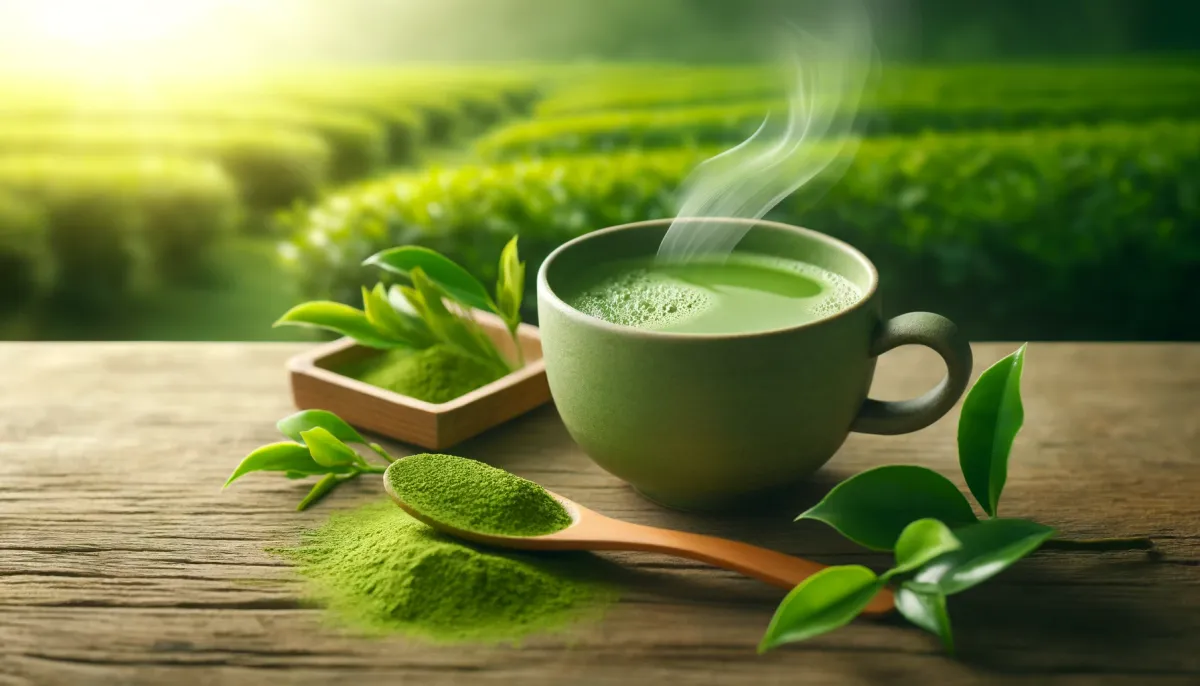The Benefits of Green Tea from Multiple Perspectives, Including EGCG in Matcha

1. Introduction
Green tea is one of the oldest beverages in the world, originating from China and later becoming popular in Japan and other parts of Asia before spreading globally. Green tea has garnered significant attention due to its high antioxidant content and multiple health benefits. Scientific research has confirmed its potential in disease prevention and overall health enhancement.
This article explores the many aspects of green tea benefits, including its effects on health, nutrition, skincare, weight control, and mental well-being. Additionally, it highlights the powerful compound EGCG (Epigallocatechin gallate) found in matcha, presenting scientific evidence to support its effects.
2. Nutritional Components of Green Tea
To better understand the benefits of green tea, we need to look at its nutritional composition and key compounds found in green tea leaves:
- Catechins
- Antioxidants crucial to green tea, with EGCG being the most potent catechin.
- Caffeine
- Stimulates the nervous system and enhances alertness. Green tea contains less caffeine than coffee, but the amount varies based on brewing methods and tea type.
- L-Theanine
- An amino acid that promotes brain function, reduces stress, and balances caffeine’s effects.
- Vitamins and Minerals
- Green tea contains vitamin B, vitamin C, vitamin E, and trace minerals such as potassium and magnesium, though in small amounts.
3. What is EGCG (Epigallocatechin Gallate)?
EGCG is a polyphenol from the catechin group, abundantly found in green tea, especially in matcha. Studies show that EGCG has significantly stronger antioxidant properties than vitamins C and E, contributing to its ability to:
- Reduce cellular inflammation
- Lower oxidative stress in the body
- Boost immune system function
- Help regulate blood lipid and glucose levels
Matcha and EGCG
Matcha is a special type of green tea grown in the shade for 2–3 weeks before harvesting, increasing its chlorophyll and amino acid content. The leaves are steamed, dried, and ground into a fine powder. When consumed, the whole tea leaf is ingested, providing higher levels of EGCG and other nutrients than traditional brewed green tea.
4. Benefits of Green Tea in Various Aspects
4.1 Cardiovascular Health
- Lowers LDL (bad cholesterol) and total cholesterol levels.
- Helps regulate blood pressure.
- Prevents blood platelet aggregation, reducing stroke and heart disease risks.
4.2 Weight Management and Metabolism Boost
- EGCG promotes thermogenesis, increasing calorie burn.
- Caffeine in green tea stimulates energy expenditure.
- L-Theanine reduces stress-related cravings.
Tip: Drinking green tea alongside a healthy diet and exercise regimen enhances weight loss effectiveness.
4.3 Brain and Nervous System Support
- EGCG reduces brain inflammation and lowers the risk of Alzheimer’s and Parkinson’s diseases.
- L-Theanine induces alpha brain waves, promoting relaxation and focus.
4.4 Antioxidant and Cancer-Prevention Properties
- Polyphenols in green tea inhibit oxidative damage.
- EGCG may slow the growth of cancer cells, such as breast and prostate cancer.
4.5 Skincare and Anti-Aging Effects
- Protects skin from free radicals and premature aging.
- Reduces skin inflammation and irritation.
- Commonly used in skincare products like creams, toners, and masks.
4.6 Stress Reduction and Mental Relaxation
- Caffeine in moderate amounts boosts alertness.
- L-Theanine promotes relaxation and reduces anxiety.
- Traditional tea ceremonies encourage mindfulness and stress relief.
4.7 Culinary Uses
- Matcha is widely used in desserts, smoothies, and health foods.
- Green tea is an ingredient in various cooking and brewing applications.
5. Unique Benefits of Matcha Over Regular Green Tea
- Higher Nutrient and EGCG Content
- Due to consuming whole leaves, matcha provides higher antioxidants and nutrients.
- Richer Flavor Profile
- Matcha has a smooth, umami taste with less bitterness than regular green tea.
- Refined Processing Techniques
- Matcha leaves are shade-grown, increasing chlorophyll and amino acid concentration.
6. Potential Risks and Precautions
While green tea and matcha offer many benefits, some precautions should be noted:
- Caffeine Sensitivity
- Excessive consumption may cause heart palpitations, insomnia, and restlessness.
- Nutrient Absorption Interference
- EGCG can hinder the absorption of iron, zinc, magnesium, and potassium if consumed in high amounts.
- Drug Interactions
- Green tea may interfere with anticoagulant medications and blood pressure drugs.
- Liver Effects
- High doses of EGCG supplements may put stress on the liver.
7. How to Maximize Green Tea Benefits
- Choose High-Quality Tea
- Opt for organic, fresh green tea for the best nutrients and flavor.
- Brewing Techniques
- Use water at 70-80°C to prevent bitter flavors and preserve nutrients.
- Optimal Consumption Frequency
- 2–3 cups daily are sufficient for most individuals.
- Matcha is best limited to 1–2 cups due to its high concentration.
- Timing Matters
- Drink between meals to minimize nutrient absorption interference.
- Complementary Lifestyle Choices
- Green tea should be part of a balanced diet and healthy lifestyle.
8. FAQs
Q1: How is matcha different from green tea?
A1: Green tea is steeped and discarded, while matcha is ground into powder and fully consumed, making it more nutrient-dense.
Q2: When is the best time to drink green tea?
A2: Between meals to avoid interference with nutrient absorption and not too late in the evening to prevent sleep disturbances.
Q3: Why does green tea sometimes taste bitter?
A3: Over-brewing or using too high temperatures releases tannins, making it bitter.
Q4: Can green tea affect iron levels?
A4: Yes, excessive EGCG may inhibit iron absorption, so it’s best consumed away from iron-rich meals.
Q5: Does iced green tea have the same benefits as hot tea?
A5: Yes, if brewed correctly, though hot tea may enhance relaxation benefits.
9. Conclusion
Green tea is more than just a refreshing beverage; it offers extensive health benefits, from antioxidant support to cognitive enhancement and weight management. EGCG, especially in matcha, contributes significantly to these advantages.
However, moderation is key. While green tea is a fantastic health booster, excessive intake may lead to unwanted side effects. Integrating it into a balanced diet and healthy lifestyle ensures the best benefits.



